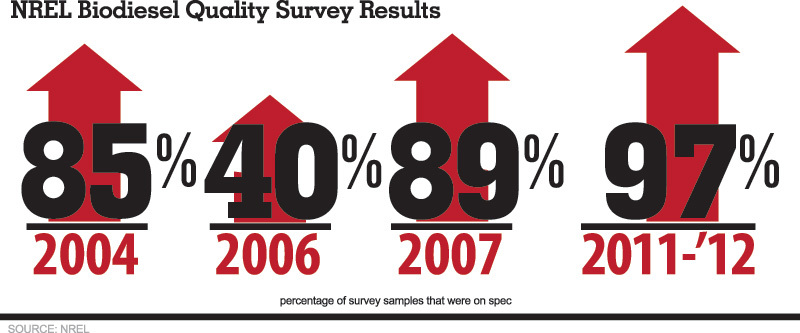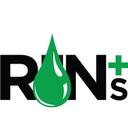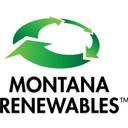Latest NREL quality survey shows 97 percent on spec

March 12, 2013
BY Ron Kotrba
Teresa Alleman, a senior chemist at National Renewable Energy Laboratory, shared the latest biodiesel fuel quality survey results at the National Biodiesel Conference & Expo in Las Vegas Feb. 4-7. NREL obtained B100 samples from 53 producers and 14 terminals from August 2011 through February 2012. Alleman said the samples collected represent 94 percent of the biodiesel volume in the marketplace today, and 97 percent of those samples met requirements in the latest version of ASTM D6751. “This is a huge improvement over previous years,” she said.
In 2006, only 40 percent of samples were on spec, a major drop from 2004 when 85 percent met the then-current ASTM spec. In 2004, however, far fewer producers existed with only a fraction of productive capacity compared to 2006. The ’06 samples showed massive failures for total glycerin, which Alleman said led to quality issues and filter clogging in Minnesota shortly after its B2 mandate went into effect, spurring balloting and passage of the Cold Soak Filtration Test—what Alleman called one of the best improvements to the specification and biodiesel quality. Since 2004 there have been 15 modifications to D6751.
All of the latest samples were on spec for total and free glycerin, and the average oxidative stability was measured at 9.5 hours. For metals, most samples were below the detectable limits with only one failure; the same sample also failed in other areas. CSFT times were also noteworthy, with all but one sample coming in below 200 seconds, with the remaining sample still within spec below 360 seconds. Even though cloud point is not regulated in D6751, Alleman noted that there was a wide range in the samples, with the average at 2 degrees Celsius (35.6 degrees Fahrenheit). “Diesel fuel has the same range,” she said. While the No.1-B grade voluntary specification with a 0.4 percent mono and year-round 200-second CSFT time limit was not in effect when the samples were taken, Alleman said 90 percent of the biodiesel volume on the market today would meet it.
Advertisement
Advertisement
Advertisement
Advertisement
Related Stories
Clean Fuels Alliance America on June 10 announced the launch of the newly redesigned BQ-9000 website, delivering a streamlined and user-friendly experience that better showcases the value of biodiesel quality assurance.
The U.S. EPA on Aug. 21 released data indicating nearly 2.04 billion RINs were generated under the RFS in August, up from 1.84 billion generated in August 2022. Total RIN generation for the first eight months of the year reached nearly 15.45 billion.
WestJet Group CEO Alexis von Hoensbroech, on Sept. 19 at the World Petroleum Congress in Calgary, addressed the airline's ambitions to achieve net-zero emissions by 2050 and the vital role SAF plays in the future of decarbonizing aviation.
Clean Fuels Alliance America, American Soybean Association, National Oilseed Processors Association the U.S. Canola Association are urging the Biden administration to adopt GREET for the purposes measuring GHG reductions for the SAF tax credit.
Montana Renewables LLC, a subsidiary of Calumet Specialty Products Partners LP, on Sept. 18 hosted an event to celebrate the first receipts of camelina oil into its biorefinery in Great Falls, Montana. The facility produces renewable diesel and SAF.
Upcoming Events










